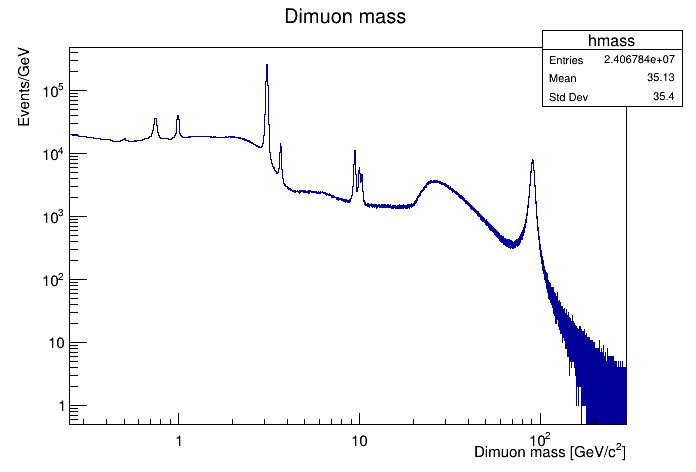We would like to investigate the possible use of the Julia programming language in a HEP C++-based framework.
HEP data are typically processed in a pipeline of codes executed in a loop over the physics events.
The CMS experiment software framework, CMSSW is based plugin modules. The physics event is represented by a C++ Event object that is passed from one module to the next one in the pipeline. A module can read data from the event, produce new data and add them to the event. The pipeline starts with a source module, that produces the initial events to process or read it from a file. The pipeline is run in a loop to process each initial event.
We propose to investigate the possibility of support the Julia programming language to write modules that could be executed together with modules written in C++.
The test the idea we have written a C++ program that runs a pipeline of two code modules, one in Julia, one in C++. The program runs on the CMS 2012 dimuon parked data set. It has a very simple format for an LHC experiment data set, which makes it convenient for such a test. The Julia module read data from each event and add data to it. It also acts as a filter selecting or rejecting the event. The C++ module produces a histogram plot from the data produced by the Julia module.
Below is the plot produced by the C++ module using ROOT from the quantity computed by the Julia module.
The code requires the ROOT library and Julia. It can be compiled using the command make. The shell environment must be set up for ROOT (e.g. by sourcing the bin/thisroot.sh file of the ROOT distribution) for both compiling the code and running it.
The code can be executed with the command line,
./EventLoop root://eospublic.cern.ch//eos/opendata/cms/derived-data/AOD2NanoAODOutreachTool/Run2012BC_DoubleMuParked_Muons.root AnalysisModule1 AnalysisModule2
It will produce a dimu.png image file with the plot.
The steering event loop is implemented in the EventLoop.cc source file. This represents the HEP framework.
The type of the event object is defined in the Event.h file. This object is accessible from both C++ and Julia (see the C++/Julia interface section below).
The C++ module is implemented in the AnalysisModule1.cc and compiled as a shared library.
The Julia module is implemented in the AnalysisModule2.jl in a Julia module.
The CxxWrap.jl library is used to provide the Julia code access to the C++ Event object. The wrapper is defined in the EventLoopGlue.cc and EventLoopGlue.jl files. Julia functions are called from C++ using the C binding built-in the Julia language and the Julia @cfunction macro.
